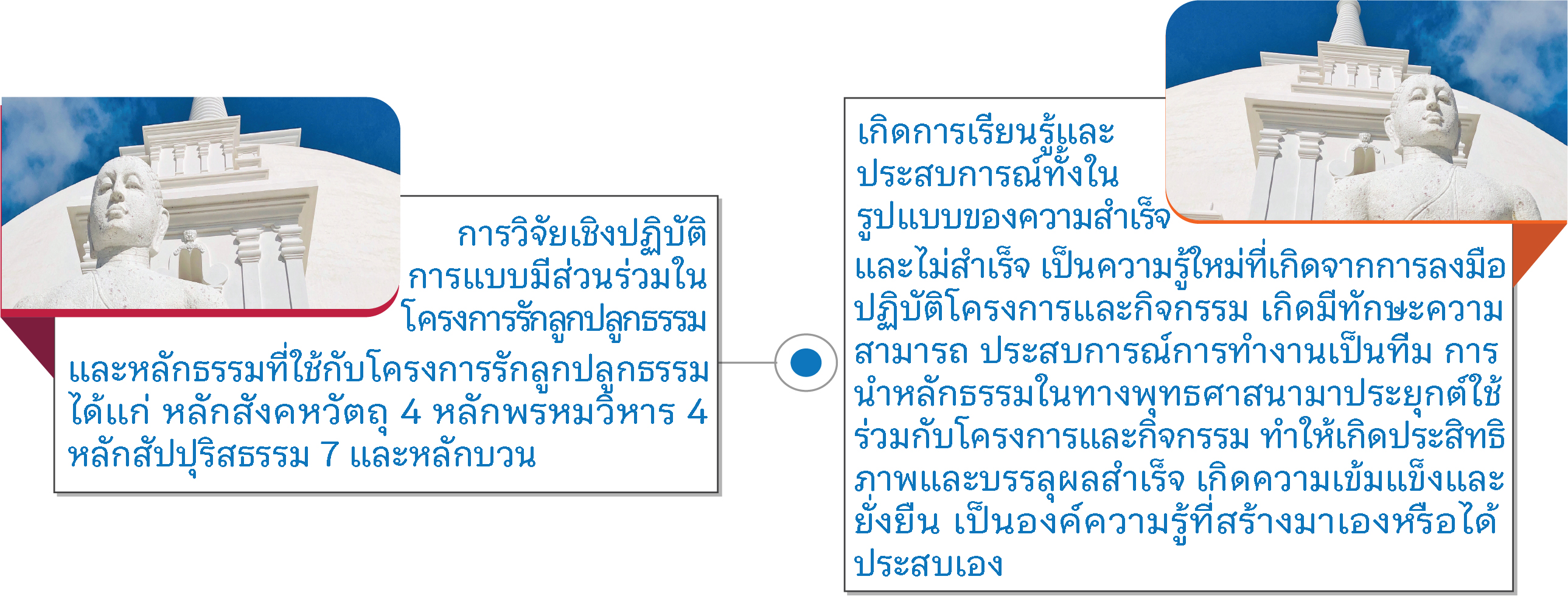Participatory Action Research in the Rak Luk Plook Tham Project of Wat Weruwan, Sahatsakhan District, Kalasin Province
Main Article Content
Abstract
The purposes of this research were: 1) to study participatory action research in the Rak Luk Plook Tham project of Weluwan Temple, 2) to study the results of changes according to the desired conditions In the Rak Luk Plook Tham project of Weruwan Temple, and 3) to present new knowledge that emerged from participatory action research in the Rak Luk Plook Tham project of Wat Weluwan. The participatory action research method has 10 steps. The target groups studied were teachers, community leaders, officials, and related persons, totaling 30 persons. The research instruments used were 1) an evaluation form before and after the Rak Luk Plook Tham project, 2) a questionnaire on satisfaction with the learning skills development project, and 3) an evaluation form for the project and activities. Qualitative data were analyzed using content analysis, and quantitative research using ready-made programs. The statistics used in the research were the mean and standard deviation.
The results revealed that:
1. The participatory action research on the project of Rak Luk Pluak Dharma of Wat Weluwan consists of 3 activities: 1) Rak Luk Pluak Dharma Activity, 2) Community Volunteer Activity, and 3) Community Forest Planting Volunteer Activity in Honor of the King, Tambon Nik, conducted according to 10 steps according to the specified criteria.
2. Development and change according to the needs of the project to love children and plant Dharma of Wat Weluwan in all 3 activities, namely, co-researchers and participants, people in the community, having love and attachment, volunteering to help the community, volunteering to plant trees, and having morality and ethics according to the criteria set at a very good level.
3. Researchers, co-researchers, monks, locals, government agencies, temples, schools, and people in Nikhom Subdistrict who participated in the activity learned and gained experience from implementing the project, gained knowledge and skills in participation, teamwork, responsibility, and Buddhist principles to apply in their lives and careers.
Article Details

This work is licensed under a Creative Commons Attribution-NonCommercial-NoDerivatives 4.0 International License.
เพื่อให้เป็นไปตามกฎหมายลิขสิทธิ์ ผู้นิพนธ์ทุกท่านต้องลงลายมือชื่อในแบบฟอร์มใบมอบลิขสิทธิ์บทความ ให้แก่วารสารฯ พร้อมกับบทความต้นฉบับที่ได้แก้ไขครั้งสุดท้าย นอกจากนี้ ผู้นิพนธ์ทุกท่านต้องยืนยันว่าบทความ ต้นฉบับที่ส่งมาตีพิมพ์นั้น ได้ส่งมาตีพิมพ์เฉพาะในวารสาร วิชาการธรรม ทรรศน์ เพียงแห่งเดียวเท่านั้น หากมีการใช้ ภาพหรือตารางของผู้นิพนธ์อื่นที่ปรากฏในสิ่งตีพิมพ์อื่นมาแล้ว ผู้นิพนธ์ต้องขออนุญาตเจ้าของลิขสิทธิ์ก่อน พร้อมทั้ง แสดงหนังสือที่ได้รับการยินยอมต่อบรรณาธิการ ก่อนที่บทความจะได้รับการตีพิมพ์References
กระทรวงวัฒนธรรรม. (2562). ชุมชนคุณธรรม สร้างคนดี สังคมดี. เข้าถึงได้จาก https://www.m-culture. go.th/th/index.php
จิรัชยา เจียวก๊ก และสันติชัย แย้มใหม่. (2559). การวิจัยเชิงปฏิบัติการแบบมีส่วนร่วมในการพัฒนาชุมชน. วารสารหาดใหญ่วิชาการ, 14(1), 79-95. https://doi.nrct.go.th//ListDoi/listDetail?Resolve_DOI=10.14456/hyaj.2016.7
พระไพศาล วิสาโล. (2554). ค่านิยมจากคนปลูกต้นไม้แห่งภูหลง. ใน วรรณา จารุสมบูรณ์. (บก.). ปลูกความสุขกลางใจ: คู่มือการจัดกระบวนการเรียนรู้เพื่อสุขภาวะทางปัญญา (3-5). กรุงเทพฯ: สามลดา.
สถาบันวิจัยประชากรและสังคม. (2564). นิยาม ประเภทครอบครัวและดัชนี ตัวชี้วัดครอบครัวอยู่ดีมีสุข. นครปฐม: มหาวิทยาลัยมหิดล.
สำนักวิชาการและมาตรฐานทางการศึกษา. (2560). แนวทางการพัฒนาและประเมินค่านิยมหลักของคนไทย 12 ประการ. กรุงเทพฯ: สำนักงานคณะกรรมการการศึกษาขั้นพื้นฐาน.
อัครเดช นีละโยธิน. (2566). การวิจัยเชิงปฏิบัติการแบบมีส่วนร่วม. วารสารวิชาการแสงอีสาน, 20(1), 108-121. https://so01.tci-thaijo.org/index.php/jsi/article/view/263455/173725
Carr, W., & Kemmis, S. (1992). Becoming critical: Education, Knowledge and action research. London: Falmer Press.

